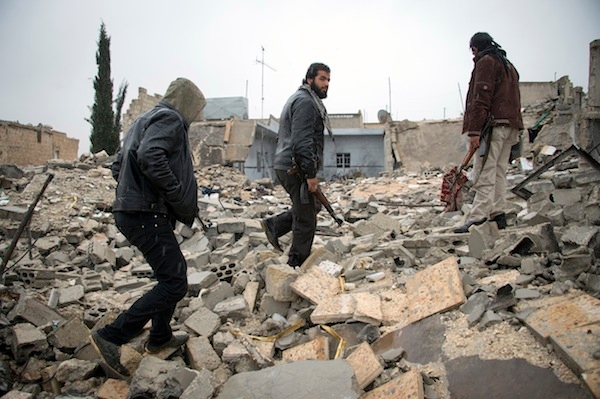Bashar al-Assad is busy writing his suicide note, ordering military officials to prepare the country’s chemical weapons for use. That’s the assessment of Pentagon officials overnight who have detected a flurry of activity at two facilities where these weapons are known to be stored – in al-Safir, on the outskirts of Aleppo; and Furqlus, about 30 miles from the already destroyed city of Homs.
The precursor chemicals for Sarin nerve gas, an extremely lethal toxin, have now been loaded into bombs that can be delivered by Syrian aircraft. Sarin was deployed most notoriously by Saddam Hussein who used it to crush a Kurdish uprising in 1988 during the Halabja massacre. More than 5,000 people were killed by a single missile.
All this gives some indication of the increasing desperation being felt by Bashar al-Assad as the rebels continue to make significant strides towards the capital. Even there his authority is severely limited with rebels laying siege to the city from four different fronts, with much of eastern Damascus having already fallen from his control.
The international community has approved the deployment of Patriot missiles along the Turkish border in response. Germany is also sending 400 troops to Turkey although they insist all these measures are purely defensive, designed to ensure the conflict remains within Syria itself.
In private, officials from the Foreign Office and State Department are known to have sent messages to the Syrian government warning of dire consequences if Assad deploys his chemical payload. Hillary Clinton is also trying to achieve Russian consensus on this. Later today she will meet with Russian Foreign Minister Sergey Lavrov in a meeting hosted by Lakhdar Brahimi, the United Nations special envoy to Syria. The hope is that both Moscow and Beijing will counsel Assad against the use of chemical weapons.
Despite the bluster there is still little appetite for intervention in Syria. This is likely to remain the case even if Assad deploys Sarin nerve gas. What might follow, however, is a serious of punitive missile strikes aimed at destroying what remains of his arsenal. That response, belated and of limited utility, underscores the grim reality that there is little the international community can do in real terms to prevent Assad using chemical weapons should he choose to do so.






Comments